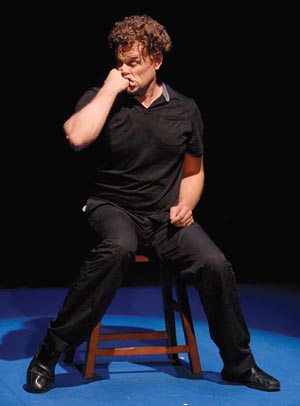
Hollister native Kirk Ward in ‘3 Stories Tall,’ playing at El
Teatro Campesino through June 28, narrates the story on a period in
his life when he leaves Hollister after graduating from San Benito
High School and returns again later. Ward uses almost no props
during the two-hour performance. He wears plain black pants and a
black shirt. There are no distractions, which puts all the
attention on him as he moves across a small area on stage.
SAN JUAN BAUTISTA
Kirk Ward remembers rumbling down Fairview Road, partying at the Quien Sabe water tower and buying a pickup from Tiffany Motors.
As he explains in “3 Stories Tall,” which he wrote and performs, Ward’s autobiographical tale starting with high school graduation in 1989 also divulges such less conventional, personal experiences as moving in with his grandmother after dropping out of college.
In one scene, he recalls sleeping at his grandmother’s house shortly after moving in and awakening in early-morning hours to the bed shaking furiously.
“Loma Prieta!” he yells from the small stage. “It’s the Loma Prieta earthquake! Loma Pri- …”
Ward stops and points out, as narrator, how he had looked down at that point and realized there was no earthquake.
“My grandmother was shaking my foot.”
From there he changes characters – which Ward often does throughout the show – this time to his own grandma as she orders him to wake up.
“Time to get up!”
“Time to get up!”
“A boy’s gotta work!”
Such a character transformation lends itself to the satirical edge throughout the solo performance, a set of monologues directed by Stephen Kearin. Ward in the show, playing at El Teatro Campesino through June 28, narrates the story on a period in his life when he leaves Hollister after graduating from San Benito High School.
He does it using occasional background music from the era such as “Pump Up the Jam” and “Can’t Touch This.” But Ward uses almost no props during the two-hour show. He wears plain black pants and a black shirt. There are no distractions, which puts all attention on Ward as he moves across a small area on stage.
Leaving Hollister
At the start when he leaves, he moves to Santa Rosa to attend college, but drops out and works at a chain shoe store before deciding to move back to his hometown. He moves in with his grandmother, and eventually his mother when that doesn’t work out, before the show culminates with a trip involving Ward, his brother and their long-absent father.
As Ward describes, the story itself is “dark,” the ending “emotional.” For the most part, however, he pulls in the audience throughout the performance with a perpetually physical, comedic style on stage such as a scene toward the end of Act 2 when his grandmother gets angry with him and her head starts “shaking like a bobble-head doll.”
He keeps it mostly light even if the subject is sore, such as an experience he describes in the first act while living in Santa Rosa when he encounters two guys at a party. He refers to one of them as having the “largest man-boy head I had ever seen” and he recounts the other as having a “rat-like” face and speaking with a voice – which Ward speaks in as that character – to fit the look.
After the larger man, Uba, rams a hole in the ceiling and hits a girl Ward knows there, he confronts the two male visitors and goes on to describe – and act out – being punched in the roof of the mouth at the tip of his front teeth and then getting struck in the eardrum.
He yells to the crowd, with a hand over his head: “Have you ever been punched in the eardrum? Well, it hurts!”
He fights “the rat” and recalls “Coach John Kieswetter’s golden rule of wrestling” from high school – “Don’t reach back, never reach back” – before eventually acting out a brawl between he and the two others while bouncing back and forth from character to character.
‘And I was back’
After Ward moves past his aspiration while employed at “Kenny’s Shoes” to one day manage a store and make $17,000 a year, he recounts moving back to Hollister, where he moves in with his grandmother.
He talks about getting a job from rancher Pete Felice, stopping at the Quien Sabe water tower and wrecking his grandfather’s 1960 Oldsmobile.
At the water tower, one of the show’s themes – living in the shadow of family members – showed face as someone at the hangout spot casually questioned Ward: “Did it suck that you were just a lineman and your brother Kip was an all-state quarterback?”
The show takes a more serious turn in the final act as Ward and his brother go visit their father, who they hadn’t seen in 10 years, in the Nevada desert.
In the end, it’s clear that “3 Stories Tall” is about Ward figuring himself out as an adult – in his own, wacky way.
Despite his tale being autobiographical, the end of the show is, as he puts it, a beginning place.
Ward calls the journey he takes a “fall from grace.”
“By the end,” he says, “I discovered who I was, what I was looking for.”









